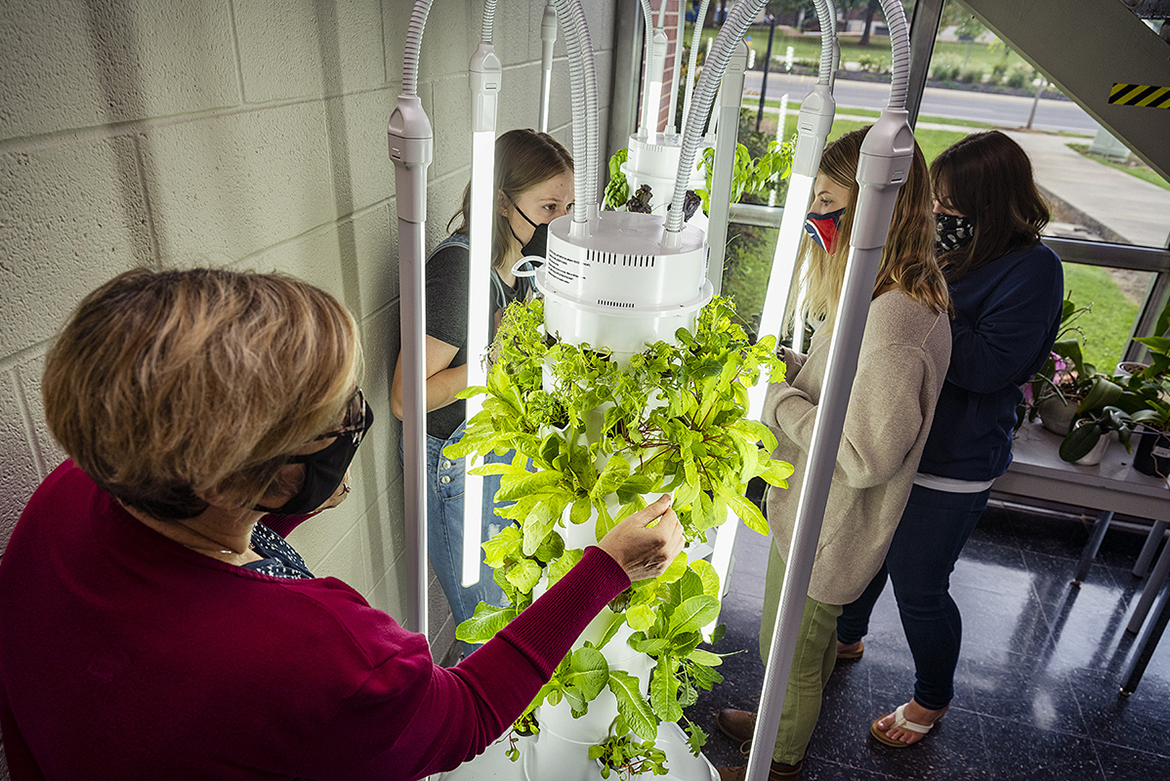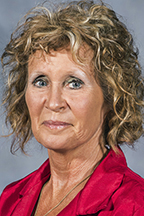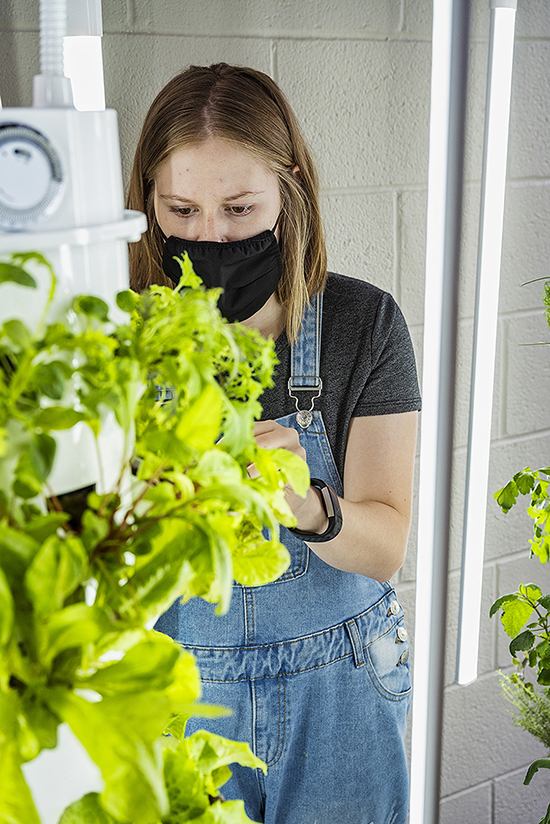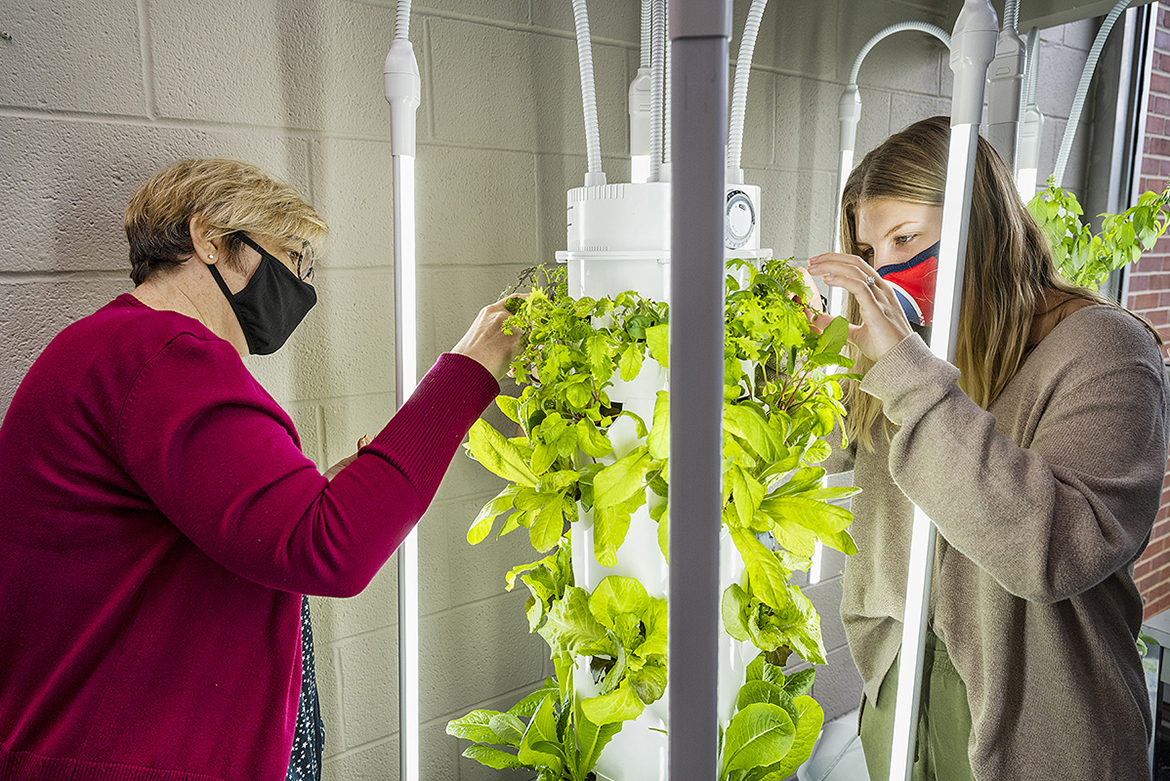Seniors who use the St. Clair Senior Center in Murfreesboro can make their lives a little greener and a little healthier with help from the MTSU Department of Human Sciences and an innovative method for growing produce and herbs.
Students are tending to plants that are being grown in the first-floor lobby of the Ellington Human Sciences Building in two vertical aeroponic garden towers filled not with soil, but with a rockwool medium, a wool-like material made by melting basaltic rock and spinning it into fibers.
“Rock wool is made from eco-friendly rock fiber,” said Mona Hitch of Tennessee Urban Farm, the Springfield, Tennessee, firm that sells the towers. “These soilless seed starter cubes provide plant roots with oxygen and consistent moisture, encouraging rapid, healthy growth.”

MTSU dietetics students take care of salad greens and herbs growing in two innovative soil-free towers in the lobby of the Elllington Human Sciences Building. From left, Teresa Wilberscheid, Montana Tomsett, Maegan Harris, and Beth Heise. (MTSU photo by Andy Heidt)
The project is funded with a $2,600 MTSU public service grant to pay for the towers and a year’s worth of plants, plant food and training.
“This is the future of farming,” Hitch said. “As farmland and water supplies diminish, the human population soars. If conventional farming continues at the current rate, we’ll likely face major food and water shortages within 40 years.”
An advanced form of hydroponics, aeroponics is the process of growing plants in an air or mist environment rather than soil. Its promoters claim it enables growers to produce more colorful, tastier, better-smelling and nutritious plants.

Dr. Elizabeth Ann Smith
After students fill the 13-gallon reservoir at the base of each tower with nutrient solution and water, a low-wattage, submersible pump pushes the mixture to the top of the garden through a pipe. The solution drips down through the interior of the tower and over the plant roots. A timer prompts regular repetition of this process.
“The garden is set to water the plants every 45 minutes for 14 hours a day and also provides light for 14 hours a day via the LED (light-emitting diode) attachments,” said Teresa Wilberscheid, a senior from Murfreesboro and one of the four students tending the plants.

MTSU dietetics student Montana Tomsett tends to greenery she and other students are growing in towers in the lobby of the Ellington Human Sciences Building. They will give the produce to the St. Clair Senior Center in Murfreesboro along with nutrition and cooking information. (MTSU photo by Andy Heidt)
One tower contains various types of lettuce and other salad greens such as kale, swiss chard and radish greens. The other contains herbs including basil, parsley, oregano, sage, lemon balm, dandelion and garlic chives.
“The plants get the nutrients they need from the food we mix into the water,” Wilberscheid said.
Because the plants are being grown in towers, the students are not dependent upon seasonal variations in climate.
“We can grow and provide produce to the seniors all winter long,” said Elizabeth Ann Smith, an assistant professor of nutrition and food science and a registered dietitian. “We know oftentimes people do not consume enough fresh produce, especially during the winter months when it is not in season.
“In fact, less than 10 percent of adults eat the recommended two to three cups of vegetables per day. By providing fresh greens and herbs year round, these dietetic students are helping the seniors meet their nutritional goals.”
Wilberscheid said the towers are special because so many different plants can be grown in such a small space.
“The plants are supposed to grow more quickly this way,” Wilberscheid said. “It’ll be interesting to see if that holds true.”
 Four students are involved with the project. They planted the seedlings and will help with the distribution of the produce. They also are preparing nutritional information that will be sent to the seniors with the produce.
Four students are involved with the project. They planted the seedlings and will help with the distribution of the produce. They also are preparing nutritional information that will be sent to the seniors with the produce.
“(The literature) will discuss the importance of the nutrients provided … to the seniors’ eye, cardiovascular and bone health, as well as the ways the veggies and herbs can add flavor and variety to the seniors’ diets,” Wilberscheid said.
Students hope to be able to don masks and interview the seniors in person about their use of the produce, but Wilberscheid said they might have to conduct those interviews by phone because of COVID-19 protocols. Hosting cooking demonstrations by video conferencing is also a possibility.
“We do plan to start out with drive-through distribution until we can meet in a socially distanced manner,” Smith said.
For more information, contact Smith at elizabeth.ann.smith@mtsu.edu or Wilberscheid at tmp4q@mtmail.mtsu.edu.
— Gina Logue (gina.logue@mtsu.edu)

Students Teresa Wilberscheid, left, and Maegan Harris tend to plants they are growing in towers in the lobby of the Ellington Human Sciences Building. They will give the salad greens and herbs to the St. Clair Senior Center along with nutrition information. (MTSU photo by Andy Heidt)

COMMENTS ARE OFF THIS POST